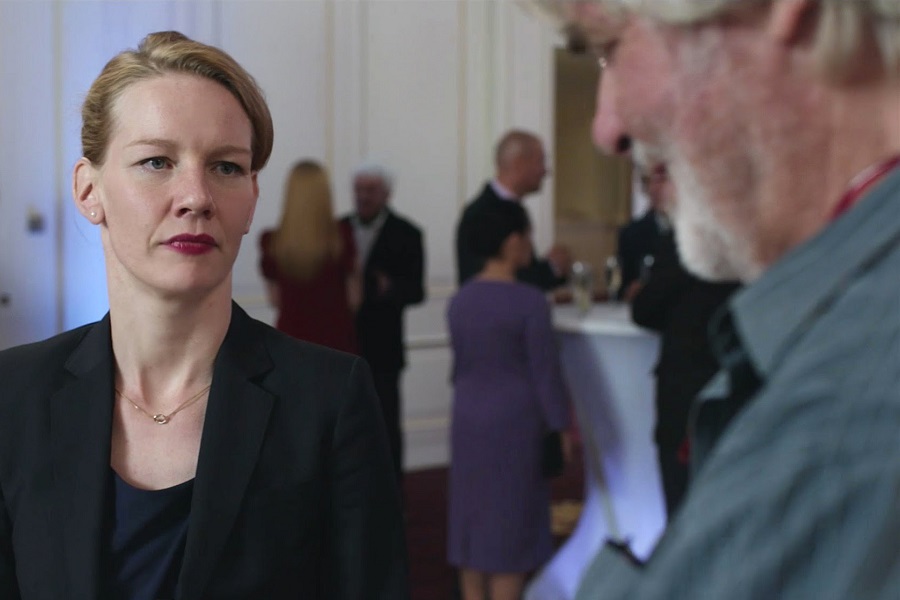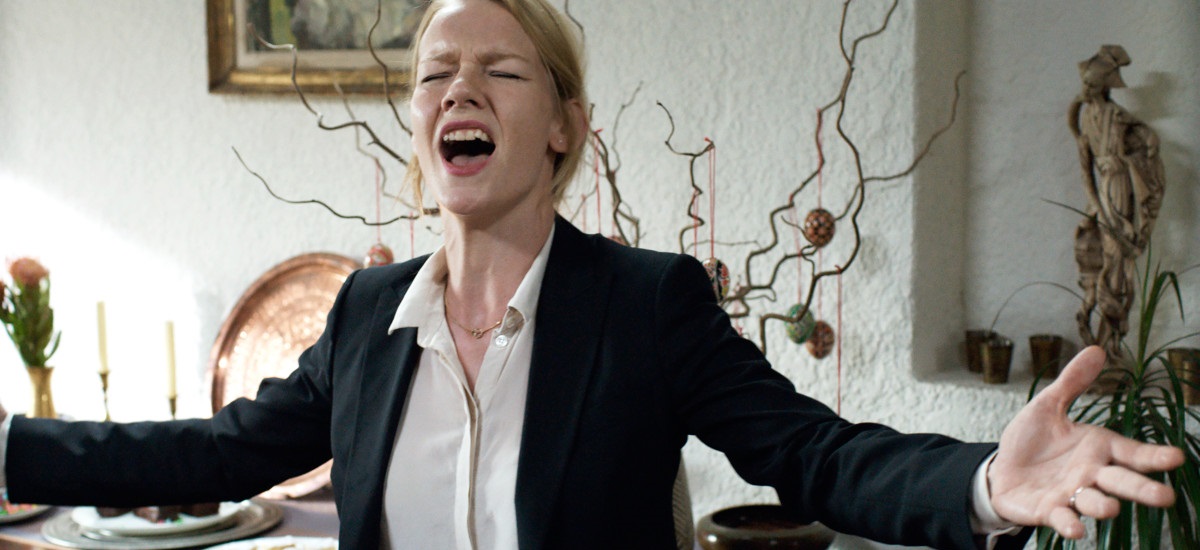Whitney. Houston. It seems like a weird start, but by the time the late pop diva’s song gets belted out, it’s sure to bring any audience to their feet. What could suitably be an emotional climax to any other movie, is here simply a moment. In the end, it is yet another in a series of long, but deft moves of subversion that Maren Ade’s Toni Erdmann makes.
The problem with categorically describing a film to someone, is that there are many times when a film works outside such stringent guidelines. Tell someone a film is a drama, they expect the movie will move them. Tell someone a film is a horror, they expect they will be scared. Tell someone a film is a comedy, and they expect to bust their gut laughing. What happens to the in-between? How does one correctly entice another individual by describing a film as a dryly comic examination of loneliness and the human condition, about letting go, accepting who we are, letting down our guard and the continuing modernization of parts of Europe? Not an easy task, but this 162 minute epic (it goes by in a breeze) deserves every chance to be seen.
Winfried (Peter Simonischek) is a lonely old divorcee. He spends his days alternating between being a middle school music teacher and prankster. Well, the 2nd part is really his default setting. At a school assembly, bidding a retiring teacher fair well, he has his students adorn their faces as skulls and sing a song about the dearly departed. Even when he answers the door for a delivery man, he can’t but help his lesser instincts, slipping in false teeth and donning a persona, one that comes to envelop him later on.

His daughter, Ines (Sandra Huller), on the other hand, is wound tighter than a two dollar watch, just moments from snapping. Her job as an executive for a consulting firm seems to have no immediate payout, just the carrot dangled by her boss that her next assignment can be anything she chooses. The current assignment has her based in Bucharest, working on behalf of an oil company. When she returns home to Germany early, to celebrate her birthday, it’s awkward father and his keen observations, that let him know all may not be well.
Due to a “spontaneous decision” – as he is fond of calling these whims – following the death of his loyal dog, Winfried finds himself in the lobby of his daughter’s job, quite literally, as Ade directly transitions Winfred from mourning in his garden to Bucharest. It’s a staggering, but economical move, asserting her confidence early on. After trying to spend a few days getting close to Ines, potentially putting off her co-workers and friends in the process, Winfried agrees to leave. The following day though, something stranger appears in his place.

© Sony Pictures Classics
As her father “departs” the picture, focus is switched to Ines, as she attempts to navigate her assignment. This job appears as merely a series of hoops to jump through, each one lit as she passes through it. Her tenacity gets praise, though feels slight for the acts she has to stomach. While taking a meeting in a courtyard one day, she notices the gleaming garish purple suit of the titular Toni Erdmann. Erdmann professes to be a life coach for executives, but is merely Winfried, sporting a lopsided wig and grotesquely fake teeth. At first it is hard to discern what his game is, as he finds opportunity again and again, to insert himself in Ines’s daily routine. Only with time, patience and a little madness, does a pattern appear.
The majority of the film feels at times like a series of vignettes, illuminating a grander whole. Each escapade gives way to another layer of humanity, whether it be two people having a quiet laugh, the exchanging of goods, or bold face lying to unsuspecting individuals in the name of a chuckle. Toni Erdmann feels it’s imperative for Ines to loosen up, as she believes her father needs to act his age and find meaning in what time he has left. Ines isn’t able to directly this, as Toni’s lies weave a web far stretching. Though most of what he says could be deemed ludicrous or inconceivable, the average person takes an ounce of it to heart, sending things down a continually winding path.
©
Peter Simonischek and Sandra Huller give powerfully stirring performances. Both wield silence as their greatest attribute. Observing, assessing and pondering the actions of the other, as well as those with whom they surround themselves, as they attempt to push each other to the brink. During a scene directly before the emergence of Toni, Ines is alone on her balcony, struggling to comprehend her feelings, save for the fact that she needs release. A typical film would underscore the scene with light strings, Ines would puff her self up and verbally expound her thoughts. Here, she saunters back into the darkness, with only her thoughts. It’s a starkly human moment.
There’s never a point during Toni Erdmann where the movie directly lets any characters off the hook for their actions, missteps or quirks. Ines has a particularly interesting sexual kink played both for laughs and strength. When one of Toni’s joking asides leads to permanent ramifications, he recoils and then is lead to see the decency of people, in the span of minutes. Even the aforementioned moment, dealing with a ballad being sung, leaves an impact that gets immediately undone. By the time a naked office party and Bulgarian mask appear, everything is possible. What may seem like a subversion of general tropes, leads to the beauty of Maren Ade’s masterpiece.
So what’s the best way to corner or label Toni Erdmann? It’s a tall order, but to put it simply, it’s a comedy. A comedy that explores the unnecessary stresses people place upon themselves. The kind of comedy that tackles complex relation between father and child. Above all though, it’s about “not losing the humor” in the face of small, unexpected encounters, regardless how alienating, awkward or foreign they may be.



